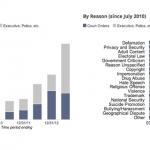
The post Google Transparency Report: Government Removal Requests Continue to Rise appeared first on HostGator Web Hosting Blog | Gator Crossing . Revelations surrounding government monitoring of heavily populated data streams and communications channels are on everyone’s mind as such news introduces a sea change of perception about our privacy rights. The simple fact is, our browsing habits and published content are no longer as “free” as they were once understood to be. But even beyond our the limitation of our own expression, what’s most concerning about these developments is the new and unprecedented level of authority governments are attempting to exercise over the world’s most important communications medium. With Google’s report as an accurate barometer, the situation is clear: the rights of Internet users are currently viewed as averse to efforts designed to shape public perception of governments, both local and international. Government Takedown Requests Increase As mentioned, the issue with this new era of Internet monitoring lies not just in limitation of our freedoms of speech, but in the presumed authority that local and national governments have to censor content on the web. What was once thought to be a public domain, where anyone could post anything provided it respected the boundaries of international law, has become a curious combination of created content and concerted takedowns. A recent Google transparency report tells the tale better than any news narrative could. According to the company’s blog post on the data, Google received 3,486 take down requests regarding 24,737 pieces of content between January and June 2013; a 68% increase over the same period in 2012. Additional data provided shows the trend is rising exponentially , with approximately 2,000 requests in 2011, 2,500 in 2012, and nearly 4,000 in 2013. A Troubling Trend What’s more stark about this data than the sheer volume of requests is the nature of such requests. According to Google, takedown orders were most often connected to stories about local government dealings and content critical of local and national governments. More often than not, these requests fell under the category of “defamation”, while some were even claimed to be copyright. The trend is startling. With more governments ordering more takedowns of critical content, the aim is clear: censorship for the preservation of public perception. Attempts to curtail public expression, particularly in the realm of government criticism, represents an unfortunate turn away from transparency and toward the limited exchange of productive, albeit challenging conversation. A Powerful Ally Fortunately, while takedown requests continue to rise, Google’s established policy against censorship of the Internet represents a valuable ally in the protection of free speech online. The data cited earlier also features a list of US and international takedown requests, and whether or not those requests were met with compliance. According to data provided, the compliance rate for these requests has fallen dramatically from 2010 to now, likely in recognition of the danger of Internet censorship. While this practice of attempting to silence critical voices may not seem like a big deal for your business or personal blog, the implications are farther-reaching than you may realize. The power of the Internet lies in the free exchange of ideas, allowing for meaningful conversation that raises profound and important ideas and institutions to the top. This process is what breeds innovation, disrupts deleterious practices, and enriches society as a whole. Fortunately, Google’s transparency report shows that those in favor of a free and unedited Internet have a powerful ally and a strong ideological foundation on their side. Government takedown requests continue to rise, but those wishing to preserve the core of what makes the Internet such a powerful tool, are not going down without a fight. web hosting

 Logging you in...
Logging you in... Loading IntenseDebate Comments...
Loading IntenseDebate Comments...